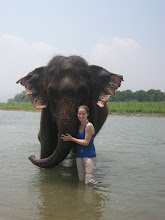Several of my Nepali friends commented to me yesterday that they had seen the photos that I posted on Facebook of the pollution in the Bagmati River. I could tell that they were slightly concerned about the way I was choosing to depict their country. It’s challenge for me to share my experiences with you in a way that correctly represents Nepal. I don’t want you to think that everything here smells bad and is dirty. But it’s also not all weddings and elephant rides either.
At the end of the day, the reason that I’m here is to work with and learn from those most in need. The people who have nothing. And I don’t think I’ve necessarily done a very good job of articulating what I've seen and what I'm learning in the two months that I've been here.
A few weeks ago, I spent several hours playing at an orphanage that is home to 24 children – 12 of whom are under the age of 4. All of these children come to this home because they have been abandoned – in the trash, in the street, in police stations. They have no past. And in all reality, they have no future. The orphanage will put them in school, cloth them, and feed them (though many are still malnourished). But will they make it to Grade 10? Pass their exams? Go to college or find a good job? It’s not out of the question, but it’s unlikely. When they misbehave, they are often beaten. When they cry? If there’s a free hand, they may get a hug. But they're generally left alone.
I also spent time at a child care center for children whose parents are laborers and are too poor to afford to pay to have someone care for their children while they work. A number of these children come from abusive homes and have very little. Several suffer from mental or emotional problems.
I'm not trying to criticize the orphanage or the parents of the children in the day care center: that’s not the main point of this post. Poverty often causes or forces people to make terrible decisions that they never would have made had their situation been different.
The point that I am trying to make is that none of these children chose this life – they were born or forced into it. And most will never be able to escape it. In direct contradiction to the American belief that if you work hard enough you’ll get what you deserve, is the reality that many people will work their whole lives and never have enough food to eat, clean water to drink, or the opportunity to decide their future for themselves.
I’ve seen a crippled man pulling himself down a busy street, trying to beg enough money to eat. I’ve seen children with leprosy, with missing limbs, with stomachs swollen from hunger, covered in feces and disease. I’ve seen children digging through the garbage, looking for bottles to sell or food to eat. Using the ground as a bathroom because they have no toilet. Drinking from polluted streams because they have no clean water.
As the rest of the world is fixated on the swine flu, Nepal has been hit with a diarrhea epidemic. More than 100 people, mainly children, have died in the past few weeks directly as a result of diarrhea. There’s no access to clean water, no toilets, and no hygiene education in many parts of Nepal. The hospitals are overcrowded. There isn’t enough medicine or medical staff. And the disease continues to spread. This isn’t an unknown medical condition - it’s diarrhea. Not only is it curable but it’s preventable. So many lives lost to such a simple, treatable disease.
I’m not writing all of this to say that if we just try a little harder, we can heal the world. You know just as well as I that no matter what we do, children will die of disease, of thirst, of violence. There will always be conflict, there will always be poverty, and there will always be pain. All I’m trying to say is that the more I see in Nepal, in Mexico, and around the world, the more that I am convinced that it is possible to do something. And to do nothing is not just irresponsible, it’s wrong. To do nothing is to say that you feel that you deserve clean water, an education, and a bright future more than any one of these children merely because you were born with the opportunities that they were not. Because we have the resources to prevent diarrhea and they do not. It’s their world just as much as it is ours. And what we do does make a difference in the end.


No comments:
Post a Comment